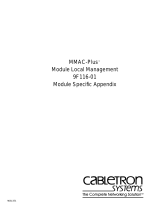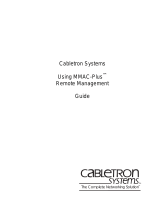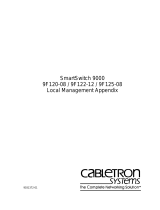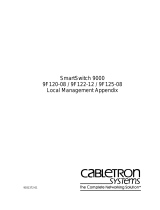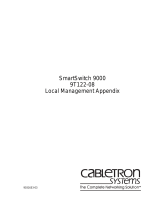Page is loading ...

SmartSwitch 9000
9T122-24
User’s Guide
9031206-02


i
Notice
Notice
Cabletron Systems reserves the right to make changes in specifications and other information
contained in this document without prior notice. The reader should in all cases consult Cabletron
Systems to determine whether any such changes have been made.
The hardware, firmware, or software described in this manual is subject to change without notice.
IN NO EVENT SHALL CABLETRON SYSTEMS BE LIABLE FOR ANY INCIDENTAL, INDIRECT,
SPECIAL, OR CONSEQUENTIAL DAMAGES WHATSOEVER (INCLUDING BUT NOT LIMITED
TO LOST PROFITS) ARISING OUT OF OR RELATED TO THIS MANUAL OR THE INFORMATION
CONTAINED IN IT, EVEN IF CABLETRON SYSTEMS HAS BEEN ADVISED OF, KNOWN, OR
SHOULD HAVE KNOWN, THE POSSIBILITY OF SUCH DAMAGES.
© Copyright March 1998 by:
Cabletron Systems, Inc.
35 Industrial Way
Rochester, NH 03867-5005
All Rights Reserved
Printed in the United States of America
Order Number: 9031206-02
LANVIEW
is a registered trademark, and
SmartSwitch
is a trademark of Cabletron Systems, Inc.
CompuServe
is a registered trademark of CompuServe, Inc.
i960 microprocessor
is a registered trademark of Intel Corp.
Ethernet
is a trademark of Xerox Corporation.

Notice
ii
FCC Notice
This device complies with Part 15 of the FCC rules. Operation is subject to the following two
conditions: (1) this device may not cause harmful interference, and (2) this device must accept any
interference received, including interference that may cause undesired operation.
NOTE:
This equipment has been tested and found to comply with the limits for a Class A digital
device, pursuant to Part 15 of the FCC rules. These limits are designed to provide reasonable
protection against harmful interference when the equipment is operated in a commercial environment.
This equipment uses, generates, and can radiate radio frequency energy and if not installed in
accordance with the operator’s manual, may cause harmful interference to radio communications.
Operation of this equipment in a residential area is likely to cause interference in which case the user
will be required to correct the interference at his own expense.
WARNING:
Changes or modifications made to this device which are not expressly approved by the
party responsible for compliance could void the user’s authority to operate the equipment.
VCCI Notice
This is a Class A product based on the standard of the Voluntary Control Council for Interference by
Information Technology Equipment (VCCI). If this equipment is used in a domestic environment,
radio disturbance may arise. When such trouble occurs, the user may be required to take corrective
actions.
DOC Notice
This digital apparatus does not exceed the Class A limits for radio noise emissions from digital
apparatus set out in the Radio Interference Regulations of the Canadian Department of
Communications.
Le présent appareil numérique n’émet pas de bruits radioélectriques dépassant les limites applicables
aux appareils numériques de la class A prescrites dans le Règlement sur le brouillage radioélectrique
édicté par le ministère des Communications du Canada.

iii
Notice
DECLARATION OF CONFORMITY
ADDENDUM
Application of Council Directive(s):
89/336/EEC
73/23/EEC
Manufacturer’s Name:
Cabletron Systems, Inc.
Manufacturer’s Address:
35 Industrial Way
PO Box 5005
Rochester, NH 03867
European Representative Name:
Mr. J. Solari
European Representative Address:
Cabletron Systems Limited
Nexus House, Newbury Business Park
London Road, Newbury
Berkshire RG13 2PZ, England
Conformance to Directive(s)/Product Standards:
EC Directive 89/336/EEC
EC Directive 73/23/EEC
EN 55022
EN 50082-1
EN 60950
Equipment Type/Environment:
Networking Equipment, for use in a
Commercial or Light
Industrial Environment.
We the undersigned, hereby declare, under our sole responsibility, that the equipment packaged with
this notice conforms to the above directives.
Manufacturer Legal Representative in Europe
Mr. Ronald Fotino Mr. J. Solari
____________________________________________________ ______________________________________________________
Full Name Full Name
Principal Compliance Engineer Managing Director - E.M.E.A.
____________________________________________________ ______________________________________________________
Title Title
Rochester, NH, USA Newbury, Berkshire, England
____________________________________________________ ______________________________________________________
Location Location

Notice
iv

v
Contents
Chapter 1 Introduction
Features...........................................................................................................................1-1
Related Manuals............................................................................................................1-4
Getting Help ..................................................................................................................1-4
Chapter 2 Installation
Installing the MicroLAN Module...............................................................................2-1
The Reset Switch ...........................................................................................................2-3
User-Accessible Components......................................................................................2-4
Setting the Module Card DIP Switch.........................................................................2-5
Ring Speed .....................................................................................................................2-6
Multi-Ring Out Capability...........................................................................................2-7
Chapter 3 Operation
Bridging..........................................................................................................................3-2
Transparent Bridging.............................................................................................3-2
Source Route Bridging ..........................................................................................3-3
Spanning Tree Algorithm......................................................................................3-3
Flexible Network Bus (FNB)........................................................................................3-4
System Management Buses .........................................................................................3-4
SMB-1 Bus...............................................................................................................3-4
SMB-10 Bus.............................................................................................................3-4
System Diagnostic Controller...................................................................................... 3-5
DC/DC Converter ........................................................................................................3-5
FNB Interface.................................................................................................................3-5
i960 Core......................................................................................................................... 3-5
Chapter 4 LANVIEW LEDs
Chapter 5 Specifications
Safety...............................................................................................................................5-1
Service............................................................................................................................. 5-1
Physical...........................................................................................................................5-2
Dimensions:............................................................................................................ 5-2
Weight:.....................................................................................................................5-2
Electrical......................................................................................................................... 5-2

Contents
vi

1-1
Chapter 1
Introduction
The 9T122-24 MicroLAN™ Switch Module, shown in Figure 1-1, is a three port
Token Ring bridge and router module. This module supports either one token
ring with 24 HUB connections, or two separate Token Rings with 12 HUB
connections, and an interface to the FNB backplane.
Features
Processor
The 9T122-24 is equipped with an advanced Intel i960 microprocessor. This
microprocessor provides a platform for all management functions within a
scalable RISC-based architecture.
System Management
Interfaces to the two System Management Buses (SMB-1 and SMB-10) for
intermodule management.
Connectivity
The 9T122-24 provides 24 RJ-45 Trunk Coupling Unit (TCU) lobe connectors. The
connectors may be configured as one 24-port ring (
default
) or two 12-port rings.
Bridging/Routing
Bridging/Routing between the front panel Token Ring connections and/or to any
other module in the chassis via FNB-1 or FNB-2 of the FNB bus. The module is
capable of Transparent Bridging or Source Route Bridging. IEEE 802.1d Spanning
Tree Protocol is supported in all bridging functions. Translational bridging
between Source Routing and Transparent Frames types is also performed.

Introduction
1-2
Management Information Base (MIB) Support
The 9T122-24 module provides MIB support including:
• IETF MIB II (RFC 1213)
• IETF RMON MIB (RFC 1271 and 1513)
• IETF Bridge MIBs (RFC 1493 and 1525)
• IEEE 802.5 Token Ring MIB (RFC 1231)
• Cabletron Enterprise MIBs
Ring Security
This feature prevents unauthorized stations from attaching to the ring. Using
Local or Remote Management, the module may be configured as to which MAC
addresses are allowed to operate on the ring.
Multi-Ring Out Capability
With this feature any port of the module may be configured as a ring-out port
through management software. In this configuration a stand-alone passive
concentrator (such as an IBM 8228 MAU) may be added to the ring.
Telnet
A telnet session can be set up with the module to provide access to the Local
Management screens.
LANVIEW LEDs
The 9T122-24 use LANVIEW – the Cabletron Systems built-in visual diagnostic
and status monitoring system. With LANVIEW LEDs, you can quickly identify
the device, port, and physical layer status at a glance.
Hot Swapping
The 9T122-24 can be installed or removed from the chassis while the SmartSwitch
9000 is powered up without affecting the operation of the remaining modules in
the chassis.
For a complete list of supported MIBs, refer to the release notes provided in the
module package.
NOTE

1-3
Introduction
Figure 1-1. The 9T122-24 MicroLAN Module
1
2
1
2
3
4
5
6
7
8
9
10
11
12
13
14
15
16
17
18
19
20
21
22
23
24
16 Mb
SMB CPU
FNB
9T122-24
TOKEN RING

Introduction
1-4
Related Manuals
The manuals listed below should be used to supplement the procedures and
technical data contained in this manual.
SmartSwitch 9000 Installation Guide
SmartSwitch 9000 Operations Guide
SmartSwitch 9000 9C300-1 Environmental Module User’s Guide
SmartSwitch 9000 9C214-1 AC Power Supply User’s Guide
SmartSwitch 9000 Local Management User’s Guide
Getting Help
For additional support related to this device or document, contact the Cabletron Systems Global Call
Center:
Before calling the Cabletron Systems Global Call Center, have the following information ready:
• Your Cabletron Systems service contract number
• A description of the failure
• A description of any action(s) already taken to resolve the problem (e.g., changing mode switches,
rebooting the unit, etc.)
• The serial and revision numbers of all involved Cabletron Systems products in the network
• A description of your network environment (layout, cable type, etc.)
• Network load and frame size at the time of trouble (if known)
• The device history (i.e., have you returned the device before, is this a recurring problem, etc.)
• Any previous Return Material Authorization (RMA) numbers
Phone (603) 332-9400
Internet mail suppor[email protected]
FTP ctron.com (134.141.197.25)
Login
anonymous
Password
your email address
BBS (603) 335-3358
Modem setting 8N1: 8 data bits, No parity, 1 stop bit
For additional information about Cabletron Systems or its products, visit the
World Wide Web site:
http://www.cabletron.com/
For technical support, select
Service and Support
.
To send comments or suggestions concerning this document, contact the
Cabletron Systems Technical Writing Department via the following
email address:
Make sure to include the document Part Number in the email message.

2-1
Chapter 2
Installation
Installing the MicroLAN Module
The SmartSwitch 9000 MicroLAN Module may be installed into any of the 14 slots
that are available. To install, follow the steps below:
1. Switch off the power supplies and remove all power from the SmartSwitch
9000 chassis.
2. Remove the blank panels, covering the slots that the module is being mounted
in. All other slots must be covered, if modules are not being installed, to
ensure proper airflow and cooling.
3. Carefully remove the module from the shipping box. (Save the box and
packing materials in the event the module must be reshipped.)
4. Attach one end of the ESD wrist strap packaged with the SmartSwitch 9000
chassis to your wrist. Plug the other end into the ESD Wrist Strap Grounding
receptacle in the lower right corner of the SmartSwitch 9000 Chassis shown in
Figure 2-1.
5. Remove the module from the plastic bag. Observe all precautions to prevent
damage from Electrostatic Discharge (ESD).
6. Carefully examine the module, checking for damage. If any damage exists,
DO NOT install the module. Contact Cabletron Systems Technical Support
immediately.
7. Slide the module into a slot and lock down both the top and bottom plastic
tabs, as shown in Figure 2-1. Take care that the module slides in straight and
engages the backplane connectors properly. When installing the module,
ensure that both circuit cards are between the card guides, as shown in
Figure 2-1. Check both the upper and lower tracks of both cards.

Installation
2-2
Figure 2-1. Installing the MicroLAN Module
Metal Back-Panel
Module Guides
Module
Jack for ESD
Wrist Strap
Plastic Tab
Warning:
Ensure that the circuit card is between the
card guides.
Lock down the top and bottom plastic tabs
at the same time, applying even pressure.

2-3
Installation
The Reset Switch
The Reset switch is located on the front panel, under the top plastic tab as shown
in Figure 2-2. It serves two functions:
• Pressing the reset switch twice within three seconds causes the processor (i960)
to reset.
• Pressing and holding the switch on for three or more seconds causes the
module to shutdown. Pressing and holding again for three seconds restarts the
module.
SNMP management may be used to disable this switch to enhance module
security.
Figure 2-2. The Reset Switch
SMB
CPU
Reset Switch

Installation
2-4
User-Accessible Components
Figure 2-3 shows the various components that are accessible to the user. These
consist of an eight-position dip switch (explained in the next section), replaceable
PROMs and sockets for RAM. These will be used for future upgrades.
Figure 2-3. User Accessible Components
SMB-1 PROM
i960 Processor
Flash SIMM
Socket
DIP Switch
Boot PROM
Local Program Memory
SIMM Socket
Shared Packet
Memory SIMM

Installation
2-6
See the
Cautions
at the end of this table.
Ring Speed
The module defaults to a 16Mbps ring speed on all rings. This may be changed
though local management.
Table 2-1. Function of DIP Switch
Switch Function Description
8 Clear Password
1
When toggled, this switch clears user-entered
passwords stored in NVRAM, and restores the
default passwords. Once reset you can use the
defaults or enter new passwords.
7 Clear NVRAM
2
The module uses NVRAM to store user entered
parameters such as IP addresses, device name, etc.
To reset these parameters to the factory defaults,
toggle this switch. Once reset, you can use the
defaults or enter new parameters, which are stored
in NVRAM when the module is powered down,
and remain there until the switch is toggled again.
6
Force BootP
Download
Toggling this switch after pulling the board out of
the SmartSwitch 9000, clears download information
from NVRAM and forces image files to be
downloaded from the station configured to act as
that modules’ BOOTP server.
5 Reserved
For Factory Use Only
4 Reserved
For Factory Use Only
3 Reserved
For Factory Use Only
2 Reserved
For Factory Use Only
1
Ring
Configuration
Off = One ring of 24 ports (factory default)
On = two rings of 12 ports each
1
Caution: Do not toggle Switch 8 unless you intend to reset the user configured
passwords to their factory default settings.
2
Caution: Do not toggle Switch 7 unless you intend to reset the user parameters
to the factory default settings.
!
CAUTION

2-7
Installation
Multi-Ring Out Capability
Any port of the module may be configured as a ring-out port through
management software. In this configuration a stand-alone passive concentrator
(such as an IBM 8228) may be added to the ring as shown in Figure 2-5. This
allows for a star-wired network with the SmartSwitch 9000 at the center. Consult
the
SmartSwitch 9000 Local Management Guide
for information on configuring the
ports.
Figure 2-5. Using a Ring-Out Port
1
2
1
2
3
4
5
6
7
8
9
10
11
12
16 Mb
SMB CPU
FNB
9T122-24
TOKEN RING
9T122-24
IBM 8228™
STP Cable

Installation
2-8
/




